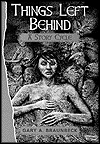
Brain Wave, by Poul Anderson
Book Review by J Y Saville
Earth has been travelling through a natural galactic force field for a few million years, which has been affecting electromagnetic and electrochemical processes, one consequence of which is that complex organic structures like the brain begin to work differently once the field is left behind. As a result, reaction and perception times are faster, and IQ, for want of a better measure, increases dramatically. Not only does every human move up the intelligence ladder, but animals do too, with chimps essentially becoming another strand of humans, and traditionally unintelligent animals such as sheep gaining enough thought to alter their relationship with their human masters.
Two linked but very different settings are used to illustrate the range of effects: an advanced research institute in New York City, and a ranch in New York State, both owned by a rich philanthropist. Where the scientists see the possibility of solving long-standing problems with increased brain-power, as well as the opportunity for research into the phenomenon itself, the general populace is more mixed in its views. Although it's phrased a little patronisingly at times, the point is still a sound one: making a person just intelligent enough to realise their own inadequacy instead of placidly coasting through life is not going to do them any favours. Neither is the sudden compelling urge to think, in a person accustomed to getting on with their life without much consideration of their situation.
The book raises interesting questions about the way societies work, and the attitudes of intellectuals; who wants to sweep the streets when they can be a philosopher? Of course, not even all the intellectuals see the change as a good thing, and there are the inevitable power struggles amid the wider struggles of society as it settles into a new order. The throwing off of artificial constraints when these are recognised as arbitrary social structures seems a more realistic outcome than in many other books of the period, and hence Brain Wave seems to have aged more gracefully.
On the whole it's handled in a thoughtful and thought-provoking way, with consequences and reactions that seem plausible. The prose style is gently laid-back, not afraid of throwing in some hard science without overdoing it. There are a few unexplored dead-ends, such as passages about Africa and Russia which are never followed up, and a touch of arrogance in the Western assumptions of the measure of progress, but these are minor irritations. This was the first Poul Anderson I'd read, and it certainly encouraged me to go back for more.
|
Click here to buy Brain Wave, by Poul Anderson on Amazon
|
Brain Wave, by Poul Anderson on Amazon

| More Books You Might Like |
| Comments on Brain Wave, by Poul Anderson |
| There are no comments on this book. |




